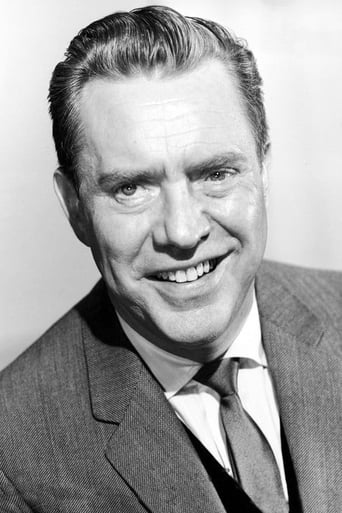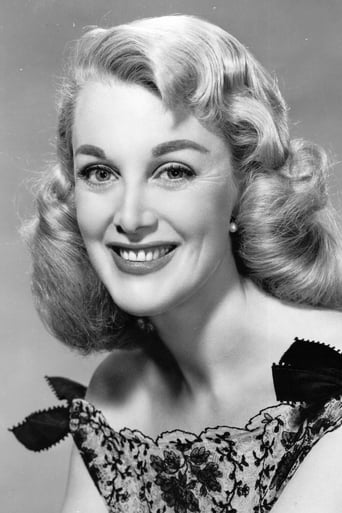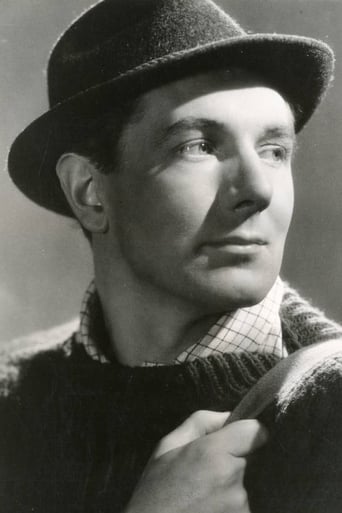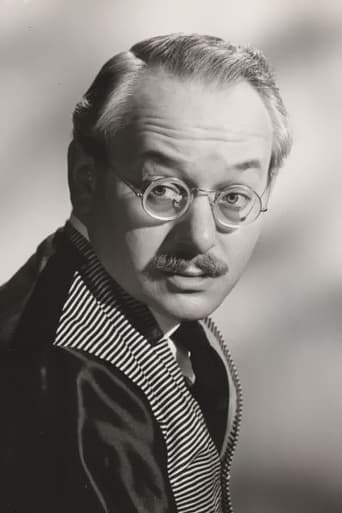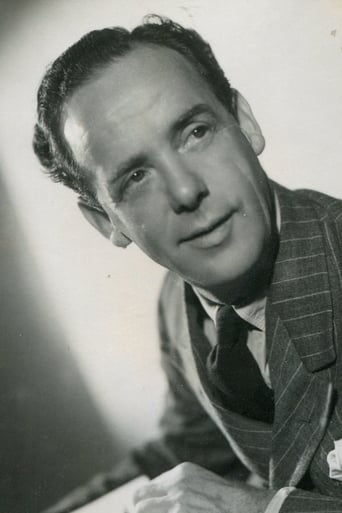KnotMissPriceless
Why so much hype?
Artivels
Undescribable Perfection
ReaderKenka
Let's be realistic.
FuzzyTagz
If the ambition is to provide two hours of instantly forgettable, popcorn-munching escapism, it succeeds.
mark.waltz
At least the United States and its allies had laws protecting freedom of speech, freedom of the press, and the ideals of life, liberty and the pursuit of happiness. This is an early view of a horrific future, the type of film that paranoia creates in the mind that there's more going on than meets the eye. Of course there is, and are we better off not knowing about it? That's just one of the questions asked in this first film version of the George Orwell novel, filmed again ironically in 1984 and redone as a Broadway play produced at another stage of fear, paranoia, and the unknown.A nuclear war destroyed democracy as the world knew it, and with part of the world under the thumb of an unseen leader only known as "Big Brother", freedom is believed to be slavery, war means peace, and ignorance of the truth is a must for survival. With the government changing history, forbidding sexual relations and turning the rest of the world into an enemy demanding of hatred, this is a 1984 I'd rather not experience, and for new lovers Edmund O'Brien and Jan Sterling, the beginning of the end. They are surrounded by a strange world of brainwashed individuals who only see big brother as an all knowing God, chances for escape are slim. Neighbors are against neighbors, little girls suspect everything you do of being a threat to big brother, and suspected traitors are not only wiped out, but eliminated from the memory of those who knew them as well. No freedom, no peace, no time to yourself, no allowance of your own thoughts and ideals. It's an ugly view of an unthinkable time, a reminder that freedom is never free, never taken for granted, and an opening to thoughts of what's going on under our noses that need to be dealt with immediately so all we cherish is never eliminated. A brilliant script with somber performances, made to keep the movie theaters it played in as quiet as quiet can be, and a numbing view of one of many forms of world domination that must be prevented. Otherwise, the only peaceful existence in a world so evil is death.
bkoganbing
9/11/01 is the date we lost a lot of freedom, perhaps irrevocably. Whether we move into the society that George Orwell describes in 1984 or retain a significant measure of individuality is up to us. But we will sacrifice a lot for security.Which in Orwell's world written in the late Forties the target date was 1984. Like On The Beach Orwell got the date wrong, but doesn't mean it still can't happen. Atomic war came in 1965 and the world divided into three great super republics, people's republics if you will. Our American leads in a mostly British supporting cast, Edmond O'Brien and Jan Sterling, are from different factions. O'Brien is a member of the Inner Party with a drone like job who is starting to question assumptions on wish his society is built. Among them marriage is tightly controlled with love not a factor. But he does fall for Jan Sterling of the Outer Party. In a country with constant monitoring, privacy is what they want. But there is no right to privacy and surveillance goes way beyond what we have post 9/11. Sterling and O'Brien pay big time for wanting some alone time.Besides Sterling and O'Brien other performances to point out are Michael Redgrave as O'Brien's superior at work, Donald Pleasance as another drone worker who is also a graduate of the state's re-education facility and David Kossoff as the kindly old antique dealer who turns out to be something else.The society most resembling the Orwellian 1984 is that of North Korea with their hermetically sealed country with a cult of secular worship of the ruling family. If the people there shake loose from the tyranny of the People's Republic it might be a great indication of hope for people who will insist on their individualism. Are we sliding in that direction? Time will tell.1984 has had a few different versions made for big and small screen. This one can stand with any of them.
ackstasis
In a recent review of Terry Gilliam's 'Brazil,' I confidently referred to the film as a "weird, twisted, fantastical tale of the sheer absurdity of an Orwellian society." In all honesty, at that time, I wasn't even certain of what constituted an "Orwellian" society, since I had never read the novel, and was only repeating fragments which I had extracted from other sources. Not more than three weeks ago, I decided to finally get my hands on George Orwell's famous dystopian story to see what it was all about, and was somewhat surprised to discover that it was one of the most engaging pieces of literature I had ever read. Eager to find out how the film adaptations treated Orwell's themes, I immediately tracked down copies of Michael Radford's timely version (released in 1984), as well as Michael Anderson's harder-to-find '1984,' released in 1956.Michael Anderson's '1984' was not, in fact, the first adaptation of George Orwell's novel, following a 1954 BBC television Sunday Night Theatre broadcast, which I've heard is phenomenal. I had expected that a 1950s adaptation would sugarcoat some of the novel's darker and more pessimistic themes, and yet I was pleasantly surprised to find that screenwriters Ralph Gilbert Bettison and William Templeton have followed Orwell's story quite closely. Edmond O'Brien plays Winston Smith, a lowly member of the Outer Party at the Ministry of Truth, where he works every day at "revising" history to correspond with Big Brother's most recent declarations. Winston secretly harbours a resentment towards Big Brother and his totalitarian government, a crime that is punishable by death should he be observed by the all-powerful Thought Police. However, Winston is not alone, and he soon discovers that the beautiful young Julia (Jan Sterling) also shares his reservations, and the two strike up a romantic relationship, meeting in locations without surveillance and always toying with the risk of capture.Inevitably, both are arrested by the dictatorial government, and Winston falls into the hands of Gen. O'Connor (changed from O'Brien in the novel, possibly to avoid the name clash with the film's main star), played by Michael Redgrave. Slowly but surely, O'Connor sets about destroying Winston's will, persisting with his torturous punishment, not only until Winston obeys Big Brother, but until he loves him. An alternative ending reportedly had Winston and Julia screaming "Down with Big Brother" as they fell before the firing squad, a conclusion that I suspect would have infuriated George Orwell. Fortunately, the version I saw stayed much truer to the spirit of the novel, ending with a "rehabilitated" Winston proclaiming his genuine love for the almighty leader. There is also a brief, ten-second epilogue in which the narrator practically spells out the film's moral – as if it wasn't clear enough already – but this minor slip-up is easily forgiven.The performances in the film are very well done. Edmond O'Brien does not look how I had originally pictured Winston Smith – perhaps a bit plumper than expected – but he did an excellent job, most impressive in the scenes of his torture. There is one brilliant long-take in which we see O'Connor pacing back and forth across the screen, periodically holding up four fingers and trying to convince Winston that there are five. Winston, pictured on a television monitor behind O'Connor, vigilantly maintains that "two and two equals four," before the latter's persistent torture finally breaks him. The acting here from both parties is sublime, and we can really feel the agony that poor Winston is enduring. Also notable is actor Donald Pleasence, who plays R. Parsons, an average workman who is hopelessly devoted to the Party and its leader, even after he is arrested for alleged thought-crimes.Perhaps one of the few complaints that I can make about the film is how Room 101 was dealt with. Though I was most impressed with O'Brien's acting during this sequence, it was all over much too quickly to be effective, and we don't even see a thing, treated only to the frantic squeaks of a mass of hungry rodents. Whilst it is often true that the less the audience sees the better, here didn't seem to be one of those moments, and the whole scene would have worked much better, in my view, had we been subjected to what Winston could see; to be face-to-face with "the worst thing in the world." Other than this, I can certainly recommend '1984' for its fine treatment of a challenging piece of dystopian literature. This one is well worth tracking down.
TheBogieFan
First things first, i am amazed at how bad the casting was on this film! Ed O'Brien is not the slimmest and just isn't Winston Smith. Donald Pleasance was terrific as Symes in the 1954 BBC version, here he plays Parsons and he doesn't suit the role at all. Strangely the Inner Party member O'Brien has been renamed O'Connor in this production. More worryingly the Prole Sector is referred to as the People's Area or some such nonsense - why why why? And all the references to "The Bells Of St Clements" at Charrington's antique shop have been removed. The screenplay is not close enough to the book, the film lacks suspense and certainly it is inferior to the marvellous 1954 BBC production which was presumably done on a much lower budget. If you want to see how 1984 can be done see that (if you can) or the more common 1980s film with John Hurt and Richard Burton, this film is a dud!

